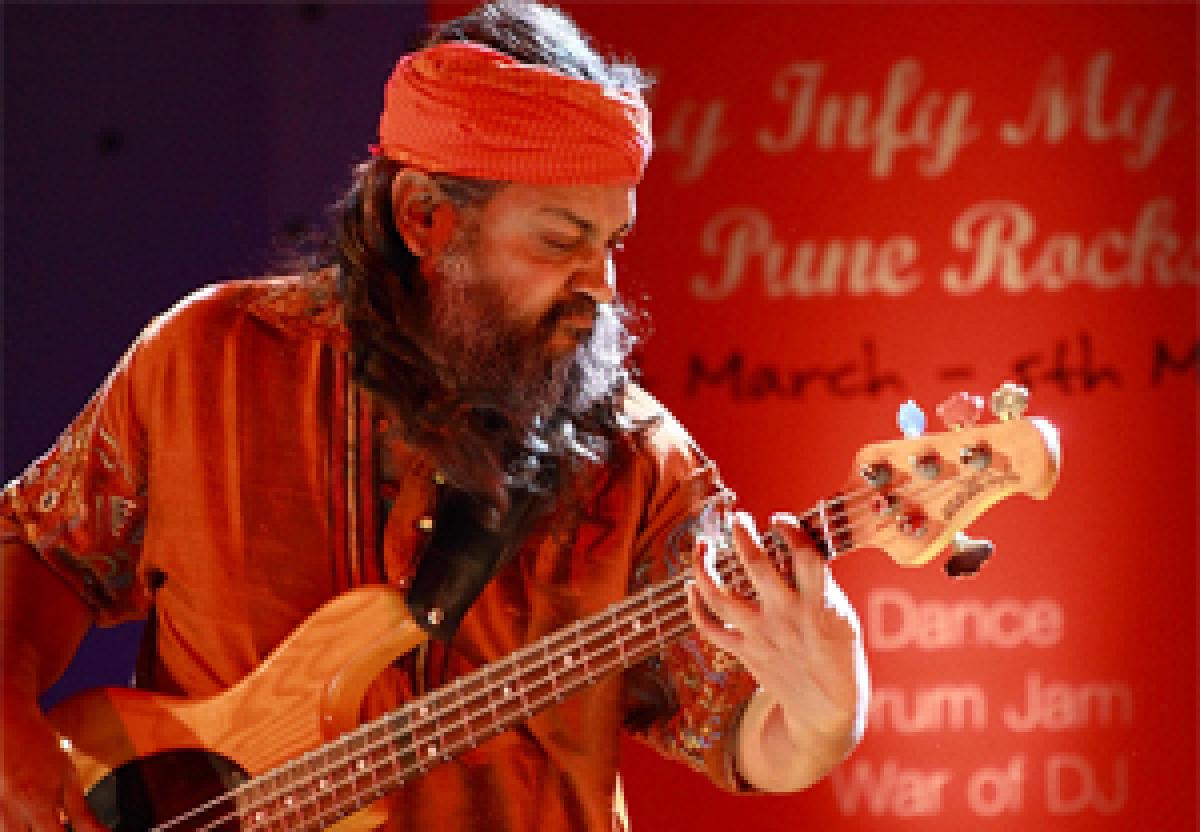Live
- Young Kabaddi Player Dies of Heart Attack During Match in Mandya
- Exciting Return of Santosh Trophy Football Tournament Kicks Off in Hyderabad
- Head Constable Dies by Suicide, Cites harssament by wife and inlaws
- Delhi BJP claims AAP govt will never pay women allowance like in Punjab
- India is 'Mother of Democracy': PM Modi
- ‘One nation, one election’ will undermine India’s federal structure: Mehbooba Mufti
- Vikram collaborates with director Madon Ashwin for ‘Chiyaan63’
- ‘Bachhala Malli’ trailer heightens anticipation
- Karnataka quota row: Backward Class forum chief warns Lingayat seer over 'tinkering with reservations'
- Tight security arrangements at Group-II examination centers District SP
Just In

Bollywood Is A Purely Money Driven Industry: Indian Ocean\'s Rahul Ram. The musical landscape of the Hindi film industry is constantly evolving and Rahul Ram, vocalist and bassist of long-running folk rock band Indian Ocean, believes \"Bollywood has changed\" and it\'s a \"purely money-driven industry\".
.jpg) New Delhi: The musical landscape of the Hindi film industry is constantly evolving and Rahul Ram, vocalist and bassist of long-running folk rock band Indian Ocean, believes "Bollywood has changed" and it's a "purely money-driven industry".
New Delhi: The musical landscape of the Hindi film industry is constantly evolving and Rahul Ram, vocalist and bassist of long-running folk rock band Indian Ocean, believes "Bollywood has changed" and it's a "purely money-driven industry".
"I think the music evolves on its own. If something works, people would want to go in that direction. Bollywood has changed. It's a purely money-driven industry," Ram told IANS in a telephonic interview.
The musician, who has composed three songs for Neeraj Ghaywan's directorial debut, the Cannes- acclaimed "Masaan", with his band Indian Ocean, says if the music of the film gets appreciated, "then more people would want to follow that".
Asked about the evolution of indie music in India, the musician said that every Indian indie band needs a chance to exhibit their talent.
He isn't, however, too keen on using the term 'indie music' for independent artists in India, and says that it's important to coin a new nomenclature altogether.
"We have to come with our own nomenclature. Non-Bollywood, non-traditional is a better term than indie. We are searching for a term for Indian Ocean for the last 25 years. We call Indian Ocean as 'frock' - folk rock," he quipped.
Indian Ocean have "adequate material" for a new full-length and have worked on two new songs with legendary ghatam player Pandit Vikku Vinayakram and saxophonist George Brooks, says Ram.
"We have another new song ready, which we will perform in Bangalore on July 31. We are doing a set called 'Side A, Side B'. It will be a four-hour concert, including a track from 'Masaan'," he said.
For "Masaan", the story of which revolves around four lives which intersect along the Ganga river, Indian Ocean created heart-warming music that duly fits in with the film's aesthetics.
"Basically, after initial talks with Neeraj, we figured that there will be one love track in the film, which was 'Tu kisi rail si guzarti hai'. To get the actual tune took us a long time. We went through four-five variations for it.
"The second song 'Mann kasturi' was approved of within an hour. I hadn't even seen the lyrics. Neeraj and Varun Grover (writer) were coming from Mumbai to listen to the music. They heard the tune and loved it. It was fixed there and then," Ram said about the musical compositions of "Masaan".
The third song titled "Bhor" is however an old Indian Ocean song from their album "Jhini", which was rendered in a different version for the film, says Ram.
"The third song was a version of our song which we released in 2003. It's called 'Bhor'. In the final edit, Neeraj had taken the original version of the song, which is way faster. But I told him that it's not working out. I am talking about a completely different mood, so I had to persuade him to use a new version," he added.
Talking about the recording process of this song, Ram said it was recorded in a "different" way from how music is recorded in studios nowadays.
"The way we recorded it is also different. Four of us stood in four different parts of the studio and played with the song. Nikhil was on guitars, Amit with flute and all three of us had vocals and we sang. And when we felt we have a version that was adequate, we thought that we should go and repair it," he said.
"Around 50 years back, there were just two tracks, so the whole orchestra used to play together. Even the old jazz records were recorded in that manner. The feel of interacting with each other is there in those live recordings, but now that feel is gone," he added.

© 2024 Hyderabad Media House Limited/The Hans India. All rights reserved. Powered by hocalwire.com







